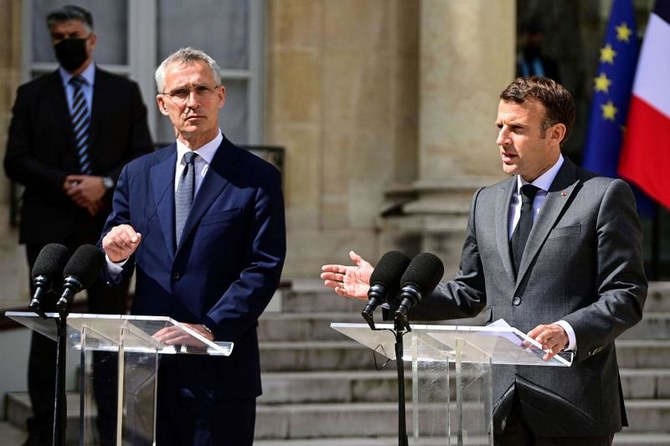
- ARAB NEWS
- 04 Jul 2025

Russian President Vladimir Putin’s order last week for a military offensive in Ukraine came after he had signed, two days beforehand, a decree recognizing the independence of two self-proclaimed states, Donetsk and Luhansk.
As a result of the destruction caused to Ukrainian military targets, there seems to be no hope of reversing the unfolding events in Ukraine, especially in the absence of any tangible support from NATO or the EU. The member countries of these two Western blocs reacted by issuing strongly worded statements condemning the Russian military action or promising to impose economic sanctions, such as travel restrictions or the blocking of bank accounts. There is little hope that such sanctions will deter Russia from what it has in mind. Moscow will probably continue until it persuades Ukraine to negotiate a solution on Putin’s terms.
Despite their genuine efforts, NATO and the EU were not able to prevent Russia’s military intervention in Ukraine. The UN system’s effectiveness in peace-keeping and peace-enforcing proved to be inadequate. The international community has to draw lessons from this failure.
Germany has to be singled out because it immediately suspended the certification process for the Nord Stream 2 gas pipeline project. This was an important step. The suspension will negatively affect Russia’s frail economy, but at the end of the day this is a lose-lose situation. Whether it will cripple Russia’s economy is questionable. We have seen in the past that US sanctions on Iran weakened the country’s economy, but it did not cripple it. The Russian economy is much bigger and more diverse than Iran’s, so it may prove to be even more resilient.
The US may use NATO’s failure to counter Russia’s military action in Ukraine to attempt to revitalize the alliance and save it from what French President Emmanuel Macron in 2019 described as its “brain death.”
The original sin in Ukraine may have been committed when this country in 2008 applied to begin a NATO Membership Action Plan. A similar initiative was later taken to sign an Association Agreement with the EU. Both of these initiatives were on the backburner after the pro-Russian Viktor Yanukovych won the 2010 presidential election. He preferred to keep his country non-aligned.
However, the support of the Ukrainian people for membership of both of these organizations was so strong that Yanukovych could not face the pressure and had to flee the country.
The support for NATO membership had previously been low in Ukraine. During the Yanukovych presidency, this support was as low as 28 percent. It went up to 69 percent only after Russia’s annexation of Crimea.
Later, NATO countries were divided on whether Ukraine should be invited to join because that would mean importing the Russia-Ukraine conflict into the alliance. Ukraine paid a heavy price for this undecided attitude.
Following the start of the Russian military operations last week, the Ukrainian ambassador in Ankara officially asked Turkey to block the passage of Russian warships through the Turkish Straits by using its rights stemming from Article 19 of the Montreux Convention. However, Turkish Foreign Minister Mevlut Cavusoglu said that Russian navy vessels that are headed for their base in Russia would be allowed to pass through the straits. Cavusoglu’s answer did not shed light on all the subtleties of the problem, as Article 19 provides that “in time of war, Turkey not being belligerent… vessels of war belonging to belligerent powers shall not pass through the straits.” What is not clear here is whether we are, technically, “in time of war” in the sense of the convention, since neither Russia nor Ukraine declared war in due form.
Urban guerilla warfare is ongoing in several Ukrainian cities, with the Ukrainians putting up tough resistance because they have been trained to do so and have several years of experience.
The Ukraine crisis is likely to cause fundamental changes in the rules governing international relations.
Yasar Yakis
In turn, Russia feels encircled and landlocked after its access to the Baltic Sea was reduced to just St. Petersburg and Kaliningrad when Estonia, Latvia and Lithuania became NATO allies. After the dismemberment of Yugoslavia, it also lost access to the Adriatic Sea. And, with Black Sea states Bulgaria and Romania also becoming members of NATO, the naval threat moved too close to Russia. This made Moscow uneasy and prompted it to attempt to create a security belt close to its borders.
The present crisis is likely to cause fundamental changes in the rules governing international relations. Barring Russia’s insatiable appetite for regaining as much former Soviet territory as possible, it is likely to remain a major preoccupation of the international community. A new power balance has to be established between Russia and the West, otherwise these tensions will not be eased.